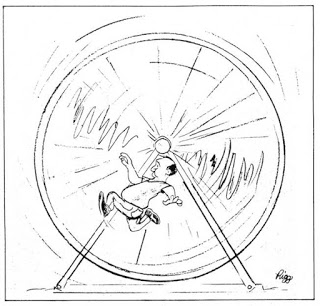Saving time—for what?
“Saving time” is an expression we hear all around us in our daily lives; in our jobs,  driving to work rather than waiting for public transport, writing out shopping lists during the coffee break, running to the shops, popping in here and there on the way, not forgetting driving the children to school and, if you’re lucky, carrying your mobile telephone. All this saves time—but for what?
driving to work rather than waiting for public transport, writing out shopping lists during the coffee break, running to the shops, popping in here and there on the way, not forgetting driving the children to school and, if you’re lucky, carrying your mobile telephone. All this saves time—but for what?
Travelling recently on a coach journey that used to take at least eight hours and made three stops for refreshments, we had waitress service instead. Once the coach has left London the waitress sets to work, collecting orders for refreshments and snacks from 46 passengers all in one sweep to save time. Can you imagine all the activity going on in the mini-kitchen about three feet square? When your drink arrives you have to perform a balancing act to drink it, for by now the coach is tearing along the motorway doing at least seventy mph. So, once the drinks are down, a look around for—you’ve guessed it—the toilets! Now, most passengers need to make at least one visit during such a journey; with all the drinks flowing freely it would take a super-man-woman to miss this one out. So to the “loo” aboard this “luxury” coach, well that is what it says on the ticket, and this begins a real adventure. Is it free, is it available, will it still be available when I get there? Once at the door a sigh of relief, but on opening the door, one is confronted with a space so small you almost have to reverse to get in. The toilet paper rolls around on the floor beside the hand towels, and the wash hand bowl is about as big as a yoghurt carton. And all this luxury for the convenience of 46 passengers and crew! The all-important time-saving here is the stopping periods previously made to “water” the passengers
Speeding past
What is also interesting while travelling on this “luxury” coach and gazing out of the windows is the hustle and bustle going on outside. Lorries and cars speed past, carrying in many instances the same goods from and to all parts of the country. And company sales representatives duplicating each other, in the competitive struggle for sales. What a crazy system; they’re trying to save time, dodging behind each other to save fuel, often transporting goods that need not be moved in the first place . . . meanwhile on the coach a change of drivers takes place without the coach stopping.
Who benefits from all this saving time? The workers or the employer? If the workers save enough time, they will be found more work to do. More profits will be enjoyed by the employers, whilst many workers will be so tired they will mostly just fall asleep until their next shift. Squeezing a bit more out of the worker’s day and increasing output greatly benefits the profit-seekers, and the pressure by the employer to seek increased productivity is never-ending.
How many of these drivers who regularly ply their way through the blue haze of exhaust, brake and tyre pollution will die from illnesses related to their employment? Lung cancer, respiratory failure and stress are all bound up with the combination of lack of exercise, volume of traffic, bad weather, missed meals, threat of breakdown, etc. Quite a reward for being “King of the Road”!
How much longer are we workers going to put up with this? Can you picture a world without these pressures? Can you imagine a society in which we can enjoy our children, enjoy travelling in comfort and stop worrying about saving time? A society with time to enjoy this beautiful world before it is destroyed by this time-saving lunacy.
Shelf-life
Food additives, preservatives and flavour enhancers are all used to promote sales growth, savings on ingredients and to give a longer shelf-life which mean that the products can be transported further, and therefore a larger potential market is available to the manufacturer.
Along with carcinogenic colourants and preservatives and organic foods polluted by acid rain, there is also another problem we all face: the deliberate irradiation of food, itself a side-effect of nuclear development. The adulteration is never-ending, and all because profit is the driving force. Come on fellow-workers, enough is enough. Let us replace this system which gives rise to such anti-social but seemingly “acceptable” behaviour.
We can establish a socialist society which will end all of this drive to adulterate, this drive to pressure us to save time, so that a few make more profit. With the means of living owned and democratically controlled by the whole of the community, it will be a classless society in which exploitation and oppression of man by man, woman by woman, man by woman and woman by man will be abolished.
The coach journey ended . . . it was an experience to be learnt from . . . and to be thankful it was over, safely.
S. Buchanan
